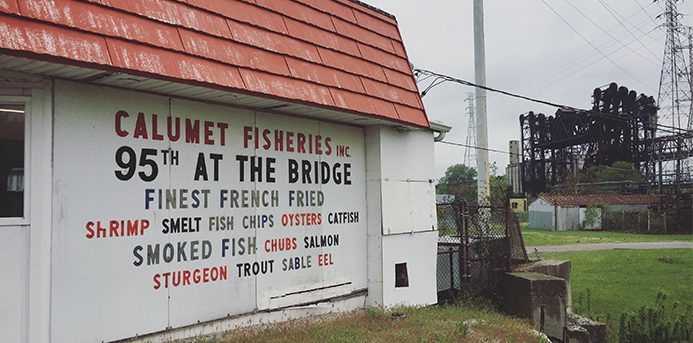Since 1928, Calumet Fisheries has perched on the northwestern side of the Calumet River, 95th at the bridge. Mark Kotlick, whose dad and uncle bought this small, no-nonsense operation in 1948, remembers, “In the old days that bridge would go up every 10 minutes. My dad would run out there and sell Kayo and little nickel bags of potato chips to the people waiting in their cars.”
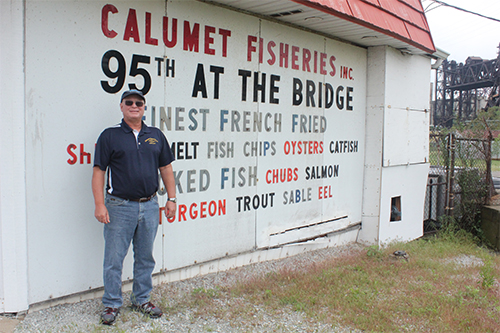
Every day, early in the morning, one of Kotlick’s men passes string through one-inch cross-sections of Atlantic King salmon. The fish is brined the night before, and for each of a couple of hundred fish steaks, the string in the fish is looped over nails affixed to a charred, carbon-black frame that was built by Kotlick’s dad and that hangs in the smoker. The fish is baked over an open fire in the smokehouse; then the fire is smothered, and the fish is smoked for a few more hours.
One cloudy afternoon, as Kotlick and I were standing by the door of one of his two 5-by-8-foot smokehouse compartments, Lois Price, a customer, poked her head around the side of the store and shouted, “Hey, thank you all for continuing the tradition. My daddy used to come here. We lived on Paxton, so I grew up over here. You can’t get this flavor anywhere else.”
It’s safe to say Calumet Fisheries is beloved by locals, and it’s one of only two such local fish-smoking operations, both grandfathered in. The Environmental Protection Agency won’t allow new ones to open. Just as you can’t burn leaves in the street anymore, you can’t operate a commercial smoker like this in the Chicago area … unless you’re Calumet Fisheries or Hagen’s Fish Market on Montrose, the only other local place where live-wood smoking is allowed.
Remembering the Smelt
Sometime in the late 50s, my dad is driving our two-tone Ford Fairlane station wagon along Lake Shore Drive. Fires are burning in soot-covered steel drums all along the shoreline, and there are shadows of people, some standing by the fires to keep warm, others looking out over the lake, hopeful for an epic catch. These were smelt fishermen, and in those days, it was not uncommon to see neighborhood guys coming home, proudly bearing buckets brimming with the little silver fish. Today, the smelt are gone, victims of invasive, predatory species and the changing Great Lakes eco-system.
“We used to get large fresh smelts from Lake Michigan,” remembers Kotlick, “but now when it’s smelt season and guys tell their wives they’re going smelt fishing with their buddies, that’s code for getting out of the house and grabbing a few beers! My smelts are now delivered fresh frozen from Canada. There’re no smelts left in Lake Michigan now.”
Just like his father before him, Kotlick prepares smelt in light breading; each one is about the size of a bite or two, so they can easily be eaten out of hand from small red-and-white cardboard containers. The flavor is mild, the fish tender.
The chub, another classic Calumet Fisheries menu item, is bigger than the smelt, maybe about 2 feet in length, brownish silver with lightly orange ventral fins. What makes chub perfect for smoking is that it’s fatty, which keeps the fish from drying out during the smoking process.
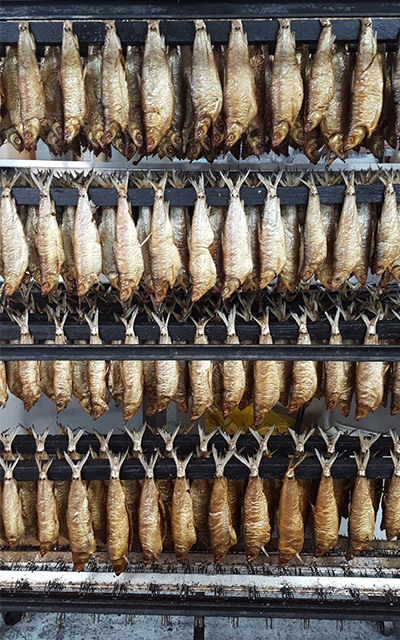
“Chub gets all golden when you smoke it,” says Kotlick, “the most delicious fish. Now and again, we’re having a hard time getting chubs.”
Craft Food Before “Craft” Was a Thing
Calumet Fisheries’ smoked fish is a handcrafted product, and it’s been that way for close to a century.
Standing next to the rack, Kotlick explains that as the fish cooks, “You have to check it. You squeeze to see how much oil is coming out of it. You look at the color. You might nibble on a little fin you pull off. And it’s different every day. If it’s cold out or humid, that will change cooking times. And you have to listen to it; if the flame is too high, you’ll hear the oils drip dripping, which means you have too much heat and you have to pull off a log or two.”
“It’s not much fun smoking, unless you love it,” Kotlick adds with a laugh. “You got hot oil dripping on you. You have to hold your breath and put your hand in there and feel what’s going on. There’s smoke burning your eyes. On the walls, you can see like 80 years of char and seasoning. This is tradition. I love it.”
Pepper-garlic salmon is the big seller, and it requires somewhat special handling: there’s garlic added to the brine that the salmon rests in before smoking, and then whole peppercorns are patted by hand on both sides of each steak. The brining and smoking process slightly browns the fish and gives it a lightly glazed crust.
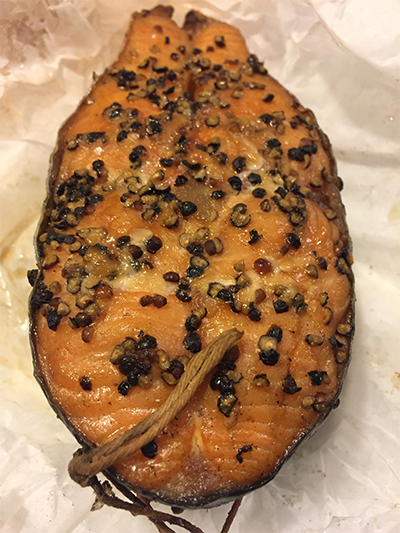
The salmon is what Anthony Bourdain ate when he visited Calumet Fisheries for an early Travel Channel “No Reservations” segment. Until that time, Kotlick told us, his business was heavily reliant upon fried foods, but “the smoked fish thing really got started again with Bourdain.”
Bourdain helped re-position Calumet Fisheries on the Chicago culinary map, and the peripatetic chef’s wry visage is now painted on the wall of the smoke shack, along with that of The Blues Brothers, who in their eponymous movie jumped the 95th Street Bridge in their retooled cop car. On this rough mural there’s also the image of a James Beard medallion. In 2010, Calumet Fisheries won James Beard “American Classic” recognition, but it hasn’t gone to their heads. “We keep our Beard award over there next to the crackers,” says Kotlick, his eyes twinkling at the irony of putting this prestigious award among his other, humbler fish shack accoutrements.
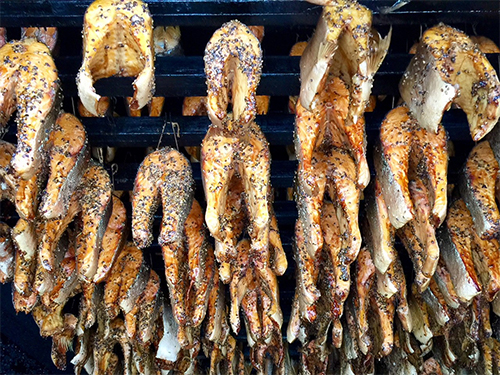
At Home
Kotlick estimates that up to 70 percent of his customers chow down on his fried fish in their cars, and his smoked products many times make their way into restaurant and home kitchens.
Calumet Fisheries has supplied fish to Publican Quality Meats, the deli offshoot of Chef Paul Kahan’s mini-empire of restaurants (Blackbird, Publican, and others). Kotlick has also supplied fish to The Aviary, the cocktailian paradise next door to Next, both operated by Chicago’s power duo of three-star Michelin Chef Grant Achatz and Nick Kokonas, who founded Tock, the breakthrough restaurant ticketing software.
When Bourdain visited this humble fish house, he pounded back a lush slice of salmon, which, like chub, is a very fatty fish. “People come early, just to get it warm,” says Kotlick, and he offered a pro tip: If you take home your smoked salmon and put it in the refrigerator (which you should if you want to keep it more than a day), let it come to room temperature before eating. Slightly warming the chilled fish encourages the flavors to emerge.
For home chefs, Kotlick recommends substituting his smoked salmon for tuna in the traditional tuna salad or in place of lox on a bagel with onion and cream cheese. We brought home some pepper-garlic salmon and prepared a salad with redskin potatoes, homemade olive-oil-based mayonnaise, celery, and salmon broken apart by hand. It was marvelous, the pepper and lemon adding sharp notes to the lush and glistening fish, the richness of the salmon somewhat modified by the potato. Each bite reflects the decades of care and handmade, time-honored attention paid to each piece of fish that comes out of the Calumet Fisheries smoker.
Calumet Fisheries
3259 E. 95th St.
Chicago
773-933-9855

David Hammond is Dining and Drinking Editor at Newcity and contributes to the Chicago Tribune and other publications. In 2004, he co-founded LTHForum.com, the 15,000 member food chat site; for several years he wrote weekly “Food Detective” columns in the Chicago Sun-Times; he writes weekly food columns for Wednesday Journal. He has written extensively about the culinary traditions of Mexico and Southeast Asia and contributed several chapters to “Street Food Around the World.”
David is a supporter of S.A.C.R.E.D., Saving Agave for Culture, Recreation, Education and Development, an organization founded by Chicagoan Lou Bankand dedicated to increasing awareness of agave distillates and ensuring that the benefits of that awareness flow to the villages of Oaxaca, Mexico. Currently, S.A.C.R.E.D is funding the development of agave farms, a library and water preservation systems for the community of Santa Catarina Minas, Oaxaca.
